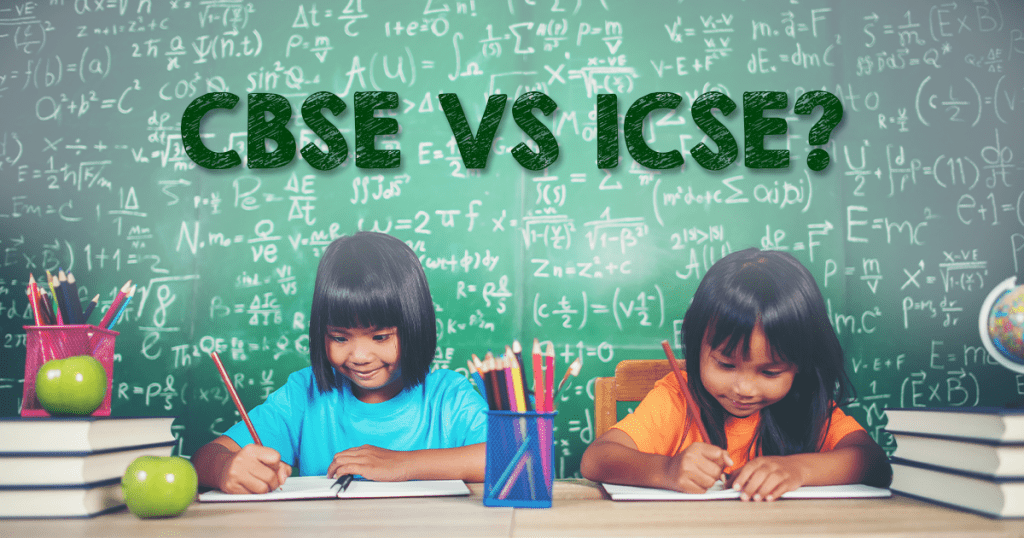CBSE vs ICSE
What are the Differences and Which Board Should You Choose?

When it comes to choosing the right education board for your child, parents often find themselves torn between CBSE (Central Board of Secondary Education) and ICSE (Indian Certificate of Secondary Education). Both boards offer quality education but differ significantly in their approach, curriculum, and focus areas. Here’s a breakdown to help you make an informed decision:
Curriculum and Syllabus
CBSE:
- Standardized Curriculum: Follows a national curriculum prescribed by NCERT.
- Focus on Science and Mathematics: More emphasis on STEM subjects.
- Practical Knowledge: Balances theoretical and practical knowledge.
- Preparation for Competitive Exams: Tailored to help students with national competitive exams like JEE and NEET.
ICSE:
- Comprehensive Curriculum: Broader and more detailed syllabus.
- Equal Focus on All Subjects: Emphasis on Arts, Science, and Languages.
- In-depth Knowledge: Promotes thorough understanding and detailed study.
- English Language Proficiency: Strong focus on English language skills.
Teaching Methodology
CBSE:
- Objective Learning: Encourages rote learning and objective-type questions.
- Assessment Patterns: More objective and straightforward assessments.
- Standardized Textbooks: Uses NCERT books, ensuring uniformity.
ICSE:
- Analytical Learning: Encourages analytical thinking and subjective questions.
- Project Work: Includes project work and practical assignments.
- Diverse Textbooks: Uses books from various publishers, allowing flexibility.
Examination and Evaluation
CBSE:
- Continuous and Comprehensive Evaluation (CCE): Emphasis on regular assessments through unit tests, projects, and quizzes.
- Board Exams: Conducts exams for Class 10 and Class 12.
ICSE:
- Semester System: Evaluation through internal assessments and final exams.
- Board Exams: Conducts exams for Class 10 (ICSE) and Class 12 (ISC).
Global Recognition and Transferability
CBSE:
- Wider Acceptance in India: More prevalent in Indian schools.
- Global Recognition: Recognized by many international universities.
- Easy Transfers: Easier for students who frequently relocate within India.
ICSE:
- International Recognition: Highly recognized by universities abroad.
- Skill Development: Emphasizes overall skill development, making students versatile.
Extracurricular Activities
CBSE:
- Balanced Approach: Offers a balance between academics and extracurricular activities.
- Limited Scope: Less focus on arts and humanities.
ICSE:
- Holistic Development: Strong emphasis on extracurricular activities, arts, and sports.
- Broader Opportunities: Encourages participation in a wide range of activities.
Choosing the Right Board
CBSE:
- Best for Students Aiming for National Competitive Exams: Ideal for those targeting JEE, NEET, and other national-level entrance exams.
- Frequent Movers: Suitable for families that relocate often within India.
- Balanced Curriculum: Good for students looking for a balanced approach between academics and extracurricular.
ICSE:
- Strong Foundation in English and Humanities: Perfect for students who excel in languages and arts.
- International Aspirations: Ideal for students planning to pursue higher education abroad.
- In-depth Learning: Suitable for students who enjoy detailed and comprehensive study.
CBSE vs ICSE: Frequently Asked Questions
Is CBSE better than ICSE?
There’s no definitive answer as it depends on individual needs. CBSE is often preferred for its focus on science and mathematics and alignment with competitive exams in India. ICSE is favored for its comprehensive and balanced curriculum with a strong emphasis on English.
What are the disadvantages of the ICSE board?
- Extensive Syllabus: ICSE can be more challenging due to its extensive syllabus, potentially leading to higher academic pressure.
- Competitive Exam Focus: It’s less focused on Indian competitive exams compared to CBSE.
Which is the Number 1 Board in India?
There’s no official ranking for educational boards in India. Both CBSE and ICSE are highly regarded, with CBSE having a wider presence across the country.
Which board is the toughest?
ICSE is often perceived as tougher due to its detailed and comprehensive syllabus and rigorous evaluation methods.
Which is better for my child's future, ICSE or CBSE?
Both are good, but it depends on the student’s goals:
- CBSE: Better for those focusing on Indian competitive exams with a strong emphasis on science and mathematics.
- ICSE: Advantageous for a more well-rounded education with a strong focus on English speaking and writing.
Is ICSE cheaper than CBSE?
The cost can vary depending on the school. However, ICSE schools are often private and may have higher fees compared to many CBSE schools. The cost difference is more about the individual school than the board itself.
Conclusion
Choosing between CBSE and ICSE depends on your child’s strengths, interests, and future aspirations. While CBSE offers a standardized and balanced curriculum ideal for competitive exams, ICSE provides a comprehensive and detailed education with a strong emphasis on English and holistic development. Evaluate your child’s needs and career goals to make the best decision for their education.
Stay tuned for more insightful articles to help your child succeed academically and personally!

